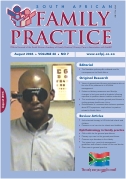Enhanced dietary awareness and lifestyle changes in first-year medical students following exposure to problem-based nutrition education
Abstract
Background The ever-increasing prevalence of chronic lifestyle-associated diseases has resulted in greater awareness of the importance of preventative medicine and its incorporation as an integral component of modern undergraduate medical curricula. As excessive dietary intake and physical inactivity are widely acknowledged as leading risk factors for the onset of chronic lifestyle-associated diseases, the promotion of a healthy lifestyle is regarded as a priority for today’s primary care physicians. For this reason, it was deemed appropriate by the designers of the problem-based learning (PBL) curriculum, which was introduced at the Nelson R. Mandela School of Medicine in 2001, to include a six-week Nutrition theme early in the medical students’ five-year curriculum. This study set out to determine the impact of this theme, which included a specific focus on the importance of nutrition in avoiding lifestyle-associated disorders, on the dietary awareness and lifestyle of the 2004 intake of medical students. Methods First-year medical students (n = 213) spent the first six weeks of their curriculum (following an orientation period) engaged in a problem-based learning Nutrition theme, which included active, personalised learning experiences such as analysing their own dietary intakes and recording their personal anthropometric measures. They were questioned two weeks after conclusion of the theme regarding (i) the impact of the theme on their dietary awareness and lifestyles, (ii) whether they had, since the start of the theme, shared their newly acquired insights with others, and (iii) the extent to which they recalled their personal measured anthropometric data and calculated kilojoule (kJ) intakes derived during the practical sessions. Results Nearly 84% of the students responded to the anonymous survey (n = 178). A greater awareness of their personal dietary intake following the completion of the Nutrition theme was acknowledged by 88.2% (n = 157), while 65.1% (n = 116) reported improvements to their general lifestyle. Eighty-five percent reported having counselled family members and friends about diet and lifestyle-related issues in the eight-week period since the start of the theme. While recall of body mass indices was higher (p >0.01) in females (85.8 %) than in males (61.5 %), recall of daily kJ intakes was independent of gender. Unsolicited mention by the students surveyed in this study of components of the South African Food-based Guidelines and recent alternative food pyramids suggests that these models were recognised as health priority areas by this student cohort. Conclusion The introduction of a Nutrition theme at the start of the problem-based medical learning curriculum appeared to have impacted significantly on the dietary awareness and lifestyles of the students surveyed, with a tendency among students to share this awareness with others. From the open-ended responses of the students, the findings of this study appear to confirm that medical students appreciated learning about their own health factors, and that personalising the information made the learning experience more valuable to them. Attitudinal changes and apparent internalisation of the newly acquired nutritional awareness were reflected by the high percentage of students who acknowledged that they had advised others within the two-week period following the completion of the theme. This augurs well for the potential preventative counselling practices of these future medical graduates. It will, however, be of interest to survey this student cohort longitudinally to establish whether their changed perceptions have a longer term impact and result in attitudes and practices that support preventative health care. SA Fam Pract 2006;48(7): 15)
Section
Original Research
By submitting manuscripts to SAFP, authors of original articles are assigning copyright to the South African Academy of Family Physicians. Copyright of review articles are assigned to the Publisher, Medpharm Publications (Pty) Ltd, unless otherwise specified. Authors may use their own work after publication without written permission, provided they acknowledge the original source. Individuals and academic institutions may freely copy and distribute articles published in SAFP for educational and research purposes without obtaining permission.

